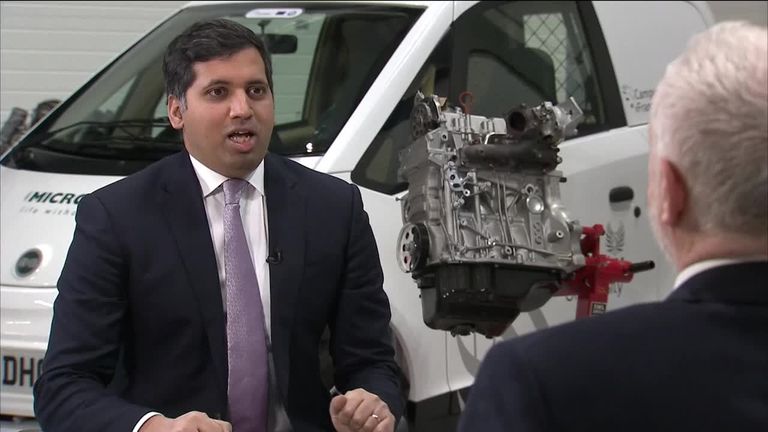Jeremy Corbyn calculates that Brexit supporters don't really care about free trade deals
The Labour leader's gamble on a customs union is raising the stakes for the Prime Minister in the week of her own big speech.
Monday 26 February 2018 22:06, UK
Fundamentally, it boils down to a conviction and a calculation.
Jeremy Corbyn simply does not believe a suite of buccaneering free trade deals, that an independent UK trade policy might achieve, are necessarily a good thing.
Indeed, there is good reason to presume that Mr Corbyn would be one of the first to protest against a free trade deal with Donald Trump's America or with China.
His calculation is that something similar is true of Labour's Leave voters.
A belief that Labour Brexit supporters could have voted for "hard" or "clean" Brexit in June last year, had every opportunity do so - and were directly targeted by the Conservative campaign - but the Prime Minister famously lost her majority.
That means Mr Corbyn can focus on a trade union-friendly story of protecting existing jobs that have built up in the systems, markets and institutional structures within the European Union.
Indeed, there was no accident in Labour's staging of this speech in 56% Leave-voting Coventry.
The West Midlands city is also known as the historic home of the UK car industry, which - Mr Corbyn argues - is under threat from "Tory Brexit".
"I don't think anyone in Coventry voted to lose the car industry, lose their jobs or lose the high-tech industries," the Labour leader told me, while sat next to a hydrogen-powered car and a driverless vehicle at Coventry University's National Transport Design Centre.
That, I suggested, was a little like the EU referendum campaign's "Project Fear" he has been so critical of.
"No no no..." the Labour leader replied.
Is this not a sellout of Labour's manifesto, which included a chapter on the party's post-Brexit independent trade policy?
"It is not a sellout of the manifesto," Mr Corbyn said.
The calculation here is that voters, even Leave supporters, are rather unmoved by the "Global Britain" free trade narrative beloved of leading Brexiteers.
A reckoning that, when push comes to shove, Welsh hill farmers, steel workers, car workers - and even those in the City of London - will prefer close alignment and the protection of their existing jobs; rather than a sunlit upland of new trade deals for as yet unformed companies, in industries that don't yet exist.
Labour's internal polling shows that Leave voters expect Brexit to bring primarily extra NHS funding, then freedom of movement controls and then the repatriation of laws.
New trade deals lag somewhat behind.
I suggested that Mr Corbyn might as well fire his shadow international trade secretary Barry Gardiner, now that - under a Labour government - the UK would not seek its own independent trade deals?
The Labour leader replied: "He has a big job to do… he was at the World Trade Organisation making a case there for fairer trade.
"The real issue is that half of our trade is with the EU. We can't walk away and lose those jobs here in Coventry or anywhere else."
But, if it is not the full gateau, there is still quite a lot of "cake and eat it" in Labour's plan.
Has Mr Corbyn any evidence at all that Brussels is ready to sign up to his party's suggestion that the UK, in a customs union with the EU, would get a say over EU-wide trade deals?
Unlike Turkey, the UK would get such privileges, he insisted, because of its size in the world.
"I don't use the word extract, but I do say we would want to negotiate," he said.
"We have discussed these issues... and we have outlined these ideas to (EU chief negotiator) Michel Barnier."
Does that not sound rather like a parallel negotiation?
"Michel Barnier is a very smart, intelligent man, it would be a bit unwise of him not to be aware of the political circumstances surrounding the people he is negotiating with," Mr Corbyn replied, which sounded vaguely threatening with regards to the position of the Prime Minister in these negotiations.
Mr Corbyn and his team have met with Mr Barnier. And shadow Brexit secretary Sir Keir Starmer has been touring European capitals.
The end result is that - two days before the release of what may well be a toxic legal text on the Irish border issue by the EU27 - the official Opposition has come up with an offer that essentially deals with commitments made in phase one of Brexit negotiations.
All that in the week of Theresa May's big "Road to Brexit" speech.
How does this all shake out? It doesn't make the Prime Minister's job easier.
Whatever the cries of "Brexit betrayal" by the Cabinet, it is difficult to escape the fact the Government's own legislation is being prepared to allow a fast-track establishment of an EU customs union in the Customs Bill.
Indeed, just six weeks ago, it was stated by a Treasury minister as a possible negotiation outcome.
The business community lined up to back Mr Corbyn on Monday.
And we know that, in Cabinet, those who favour continued alignment with the EU have been using the very example of the car industry (including at last week's Chequers summit) just as Mr Corbyn did.
The Labour leader has entered a space created by the Prime Minister's need to assuage Jacob Rees-Mogg and the Tory backbencher's band of Brexiteers.
In terms of the willingness of the EU27 to bend over backwards to be flexible to Mrs May's task of keeping her MPs on side - the real question is whether Mr Corbyn's offer increases Brussels' temptation to look beyond the official UK Government position, and towards the Parliamentary arithmetic.
It was a gamble for Mr Corbyn. But it raises the stakes for the Prime Minister.







